External Capital Formation
The value created by Hayleys for stakeholders
through its resources, activities and relationships
leads to the formation of capital external to
Hayleys. It takes several forms and resides within
our stakeholders, the material ones being investor
capital, customer & business partner capital,
employee capital and social & environmental
capital. Though external, Hayleys has access to
and makes use of these forms of capital and its
own internal capital in driving future earnings.
In this section we will discuss value creation and
external capital formation in the context of the four
material forms of capital noted above.
Investor Capital
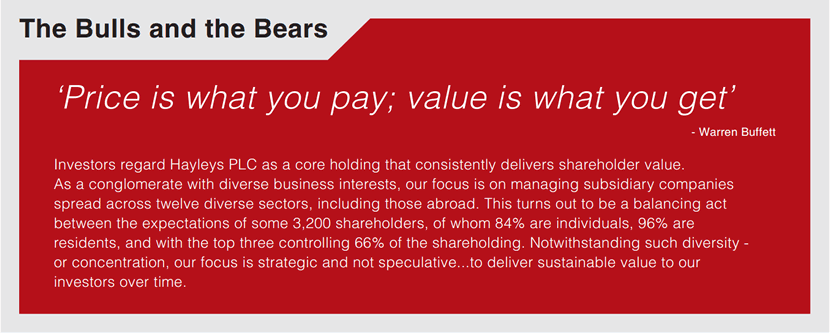
Share Price Movements
Sri Lanka’s share market recorded much volatility during the year ended 31st March 2014, affected by the relatively higher yields on fixed income securities, exchange rate volatility and tight liquidity conditions. The All Share Price Index increased slightly by 4% during the year and the HAYL.N0 share price hovered around Rs. 290 - 325, closing at Rs. 285. The share was thus trading below its net asset value of Rs. 316, with an EPS of Rs. 11.82. Market capitalisation of the share was Rs. 21.3 bn, slightly lower than the previous year’s figure of Rs. 22.4 bn.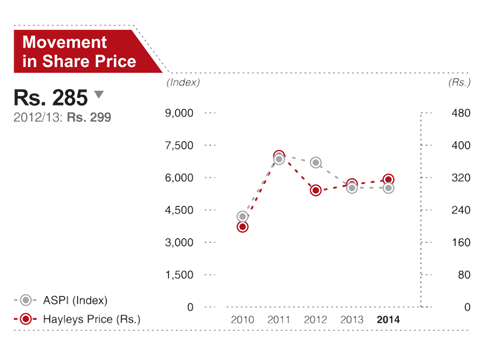
Earnings per Share and PE Ratio
The Group’s earnings per share increased marginally by 2.7% from Rs. 23.48 in the previous year to Rs. 24.11 during the period under review. The Price/Earnings ratio remained relatively constant, being 11.8 times by end-March 2014, compared to 12.7 times the previous year.Net Asset Value
The net assets per share attributable to the equity holders of the parent company increased by 7% to Rs. 316.31 during the period under review from Rs. 296.69 previous year. Therefore, by the end-March 2014, it was trading at a price-to-book value of 0.9 times against 1.0 in the previous year.Dividends
The Company has proposed a first and final dividend of Rs 5.00 per share for the period under review ensuring a steady cash flow for its investors. Dividend payout ratio was 20.7% and the dividend cover was at 4.8 times for the year.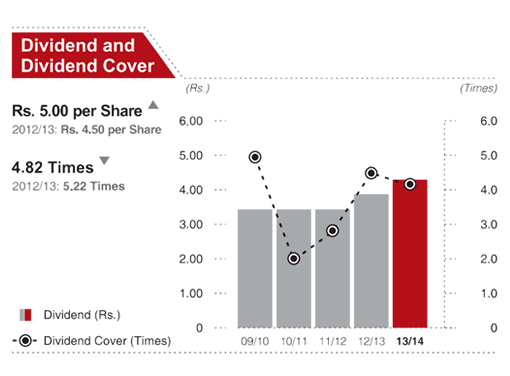
Dividend Policy
Our aim is to provide for a regular and sizeable dividend flow, whilst allowing the Company to maintain the financial flexibility to take advantage of attractive investment opportunities in the future. In keeping with historical practices, we will continue to include dividend payments as part of our commitment to creating superior shareholder value over time. In determining the dividend payout, the Board of Directors considers a variety of factors including outlook for earnings growth, dividends from subsidiaries. capital expenditure requirements, potential acquisition opportunities, Company’s liquidity position, Company’s overall debt position and the cost of raising funds from alternate sourcesThe dividend per share over the past five years has increased steadily from Rs. 3.00 in FY 2008/09 to Rs. 4.50 in FY 2012/13, while Rs. 5.00 is being proposed for FY 2013/14.
Customer and Business Partner Capital
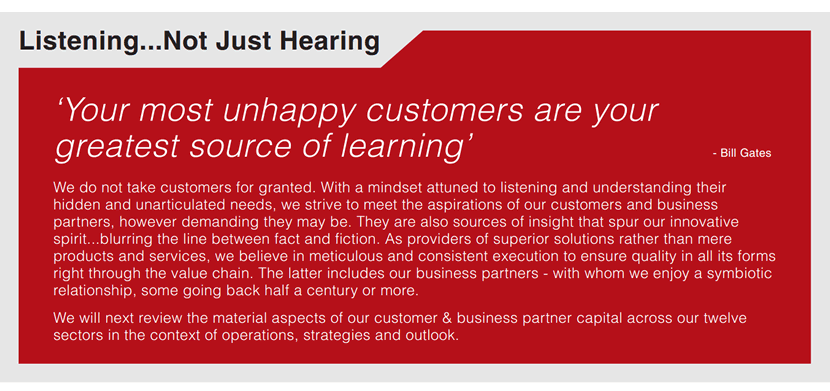
Product and Service Information
The human and environmental safety of our products and services is of utmost importance to us. We provide assurance on the safety and ethics behind our products, and ensure that our customers make informed decisions when they purchase a Hayleys product.Depending on the industry sector, Hayleys has in place procedures for product and service information and labelling.
We use product and service labelling to inform people on a variety of aspects depending on relevance and significance. They include information pertaining to sourcing of components, content, safe use and disposal. All agricultural fertilisers and pesticides for example display poison warnings and safe storage instructions, instructions on dosage and antidotes in case of consumption and also poison centre contact details, amongst others.
Compliance is then monitored across significant categories. For example 100% of significant product and service categories in the Textiles and Agriculture Sectors are subject to such procedures.
Marketing Communications
We largely communicate with our customers through advertising. We adhere to laws, standards and voluntary codes related to marketing communications, including advertising, promotion and sponsorship. Compliance includes obtaining prior approval from relevant authorities and adhering to all guidelines of our principals and the Consumer Affairs Authority in ensuring that all claims made by us are true and verifiable.Compliance
The Group has not been informed of or has pursued any action where any fines were imposed in relation to non-compliance with laws and regulations related to the provision and use of our products and services.Fibre
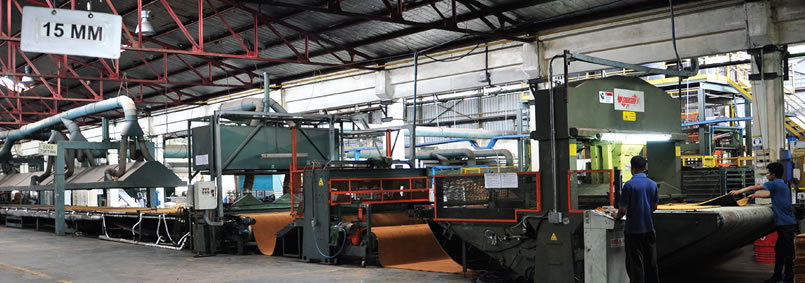
Our focused efforts
to regain market
share through
aggressive market
development
strategies targeted
new markets and
product segments
Operations
It was a challenging year for the Fibre sector with setbacks in key markets coupled with rising manufacturing cost. The sector is undergoing a restructuring exercise that includes rationalisation of plants and the implementation of lean manufacturing processes. Many initiatives were implemented to strengthen the supply chain, seek alternative materials sourcing, drive cost efficiencies and improve quality assurance systems.Strategies in Action
Our focused efforts to regain market share through aggressive market development strategies targeted new markets and product segments. Our quest for excellence in quality systems and social sustainability initiatives are continuing. BSCI certification was obtained for Floor Covering products while certification for Industrial Fibres is in progress. In Brushware, the SEDEX certification is to be completed during FY 2014/15, which is in addition to the existing SA 8000 certification. Our thrust on innovation continues, resulting in many new products being added to the product portfolio.Outlook
The primary objective going forward is to become profitable once more following the restructuring exercise. Strategies being implemented focus on product and market development, excellence in quality and cost effectiveness. Additional plant capacity is planned for 2014/15 to cater to increased demand in the Bio-engineering and Brushware product segments. Overall, the sector is optimistic of showing stronger results in FY 2014/15.| Refer for more information about the sector www.hayleysfibre.com |
 |
Hand Protection
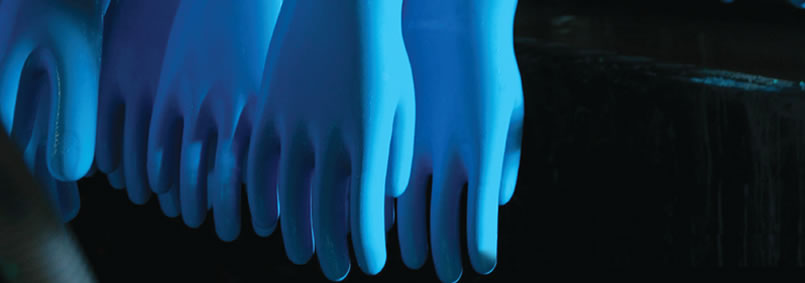
Almost entirely
export driven, the
disruptions created
very challenging
conditions for DPL
and its customers
Operations
Following a successful first quarter in terms of volumes and value generation, the Hand Protection sector went through a very difficult period as its manufacturing operations in Weliveriya and Hanwella were subject to unfounded allegations pertaining to the acidity of the ground water in the vicinity. As a result, we were compelled to suspend operations at Weliveriya from 30th July 2013. It must be emphasised that the factory had been operating with an Environmental Protection Licence (EPL) issued by the Board of Investment (BOI), and all subsequent results of investigations made available so far in the public domain have confirmed that the factories in question were not responsible for the alleged water quality issues in the neighbourhood. Furthermore, there was no legal directive (court order) to suspend operations.All manufacturing locations of the Hand Protection Sector - led by Dipped Products PLC (DPL) - meet the requirements of the respective EPLs, particularly in respect of emissions and discharges. Nevertheless, following the protests at Weliveriya, DPL took a strategic decision to invest in a new glove manufacturing factory inside the Biyagama Industrial Park, which will also open up new opportunities for expansion and new product development.
Almost entirely export driven, the disruptions created very challenging conditions for DPL and its customers. DPL worked tirelessly to meet the orders within the prevailing constraints while some of the product categories were outsourced in order to cut down the supply lead times. Customers too were continuously updated on developments concerning the affected facilities.
On a positive note, Firstlight, our unique CSR initiative linking smallholder rubber farmers with the global markets under fair trade principles, was judged the Best Innovative Model for CSR by JASTECA (Japan Sri Lanka Technical and Cultural Association). The Firstlight initiative reflects our commitment towards business sustainability in which economic, environment and social factors are integrated in order to empower smallholder rubber farmers.
Strategies in Action
The new manufacturing facility at the Biyagama Industrial Park will be commissioned in a phased manner throughout FY 2014/15. It will have sufficient capacity not only to recover the lost capacity at Weliweriya but also allow room for future expansion, thus enhancing our position as a strong and reliable manufacturer of hand protection wear. Moreover, the profile of the new plants will strengthen the proportion of high value products in the overall product portfolio.Outlook
Our key task ahead is to return to normalcy of operations by achieving the normal throughput of gloves to all our customers. In this regard, we have successfully managed the investment in the new plant in Biyagama, whilst also ensuring that all necessary procedures and monitoring mechanisms are in place for its effective functioning. Going forward we will be focused on strategic investments to enhance our product capabilities, further consolidating our position as a premier glove manufacturer in the world.| Refer for more information about the sector www.dplgroup.com |
 |
Purification
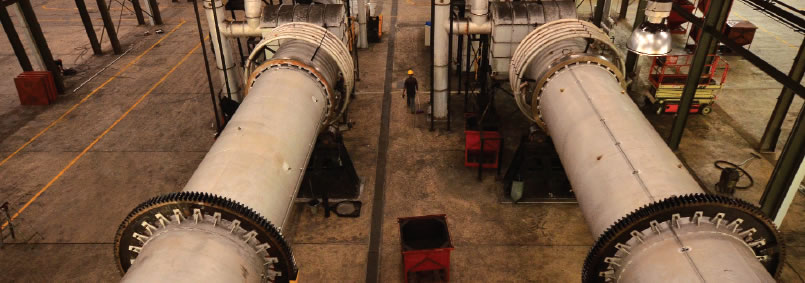
We strengthened our
value added product
portfolio during
the year including
good progress in
the Energy Storage
carbon segment
Operations
The global market proved to be challenging for the Purification sector. The slowdown of the gold mining industry decreased demand and exerted significant price pressure on activated carbons marketed to this industry segment. The modest recovery of the USA and the stagnation in Europe made it necessary to offer price reductions in order to retain key customer accounts. The situation was exacerbated by oversupply created in these markets by the entry of new manufacturers and existing manufacturers who had expanded capacities from countries such as India, Philippines and Indonesia.Input costs too aggravated the situation. The prices of our primary raw material, coconut shell charcoal, increased by over 25% in Sri Lanka and India. These sources supply the total raw material requirement of the Sri Lankan manufacturing facilities that account for nearly half of the Group’s manufacturing capacity.
In the backdrop of these challenges, marketing initiatives that enabled high capacity utilisation of all manufacturing facilities throughout the year, significant cost saving achieved under lean projects and commercialisation of new value added products helped to maintain overall profitability.
The Thailand operations under Carbokarn Co. Ltd. performed well both in activated carbon manufacture and regeneration operations, while the Shizuka factory contributed a full year of production to boost overall results. Haycarb’s Indonesian subsidiary, PT Mapalus concluded a year of exceptional performance to make significant top and bottom line contributions.
Haycarb Group successfully commissioned a new manufacturing plant under Haycarb Value Added Products (Pvt) Ltd. in July 2013. Haycarb has strengthened its value added product portfolio during the year including good progress in the Energy Storage carbon segment.
The sector also invested in its second manufacturing plant in Indonesia in the Palu Province of Central Sulawesi, successfully commissioning the plant in March 2014, under the subsidiary PT Haycarb Palu Mitra Company. All overseas manufacturing facilities completed NSF and ISO 9001 certifications during the year, aligned with the strategy to upgrade overseas plants for the manufacture of value-added products. The focus on increasing market share in Indonesia was successful whilst important new accounts were established in Europe and Far Eastern Region for specialised high value carbons.
Puritas (Pvt) Ltd., the Group’s Environmental Engineering division, increased net earnings by nearly 30% during the year through the execution of small to medium scale turnkey water treatment projects whilst embarking on initiatives to bid for large scale water projects with strategic collaborations.
The Purification sector posted turnover and profit before tax of Rs. 10,348 mn and Rs. 1,030 mn respectively for the financial year 2013/14. The net earnings before tax declined by 16% mainly due to the intense competition in global markets and the increase in input costs, even though the Company achieved significant sales volume growth.
Strategies in Action
Further work will be undertaken to achieve a deeper understanding of individual market dynamics, identify new market segments and customers, strengthen distribution channels and reinforce the Haycarb brand. The marketing and business development resources inSri Lanka and in overseas subsidiaries have been strengthened and the Sector is working in collaboration with distributors and partners to establish our presence in new geographical markets as well. The R&D team will continue to work in close collaboration with manufacturing and business development teams to improve efficiencies of processes as well as in new product development initiatives. Haycarb is also pursuing strategic initiatives to diversify in to associated products and services.
Puritas will leverage on its successful strategic partnership with Veolia Group to collaborate on large scale water treatment projects and is expected to record a significant increase to its net earnings.
Outlook
The Purification sector does not expect a speedy recovery of its traditional markets whilst the serious challenges to charcoal supplies in Sri Lanka and India are expected to continue. Haycarb also anticipates competition and pressure for pricing of raw material supplies in Thailand and Indonesia which will necessitate the Group to revise pricing with close understanding and dialogue with its key customers/distributors whilst working internally to enhance efficiencies and reduce costs.The parity levels for currencies in Indonesia and Sri Lanka are not expected to be favourable for exports in the coming year, and are not expected to offset the escalation of input costs and overheads.
Haycarb has planned for growth based on increased manufacturing capacity, new product commercialisation, entry in to new geographical markets whilst strengthening its presence in traditional market segments, rationalising of processes and reducing cost through its Lean platform.
| Refer for more information about the sector www.haycarb.com |
 |
Textiles
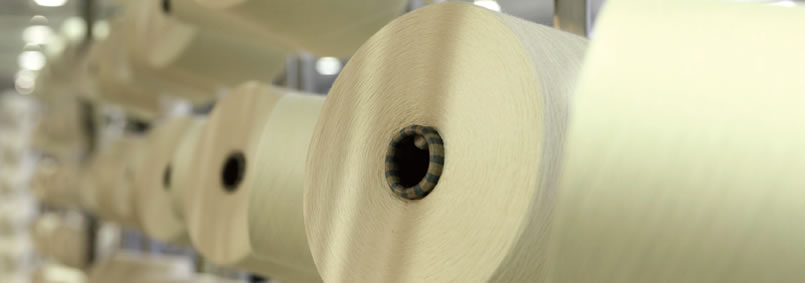
With the
demonstration of a
positive change in
2013/14, the Hayleys
Textiles sector
will consolidate
its growth through
several ongoing
and new initiatives
targeting both
customers and
suppliers
Operations
Hayleys Textiles sector is primarily engaged in weft knitting, dyeing and finishing of cotton, cotton blends and polyester fabric. They are produced using some of the best machinery to ensure the high quality standards required by our customers, while our capability to carry out additional finishes gives us added flexibility in fulfilling any specialised needs of customers.Strategies in Action
The entire sector functions on an industry specific ERP system (SAP), while we also implemented the latest product planning tool. These systems give us the required flexibility to plan and execute day-to-day operations in an efficient and effective manner and have contributed to improving performance all round.The key initiatives undertaken during the year to improve customer convenience include:
- Frequent progress meetings with customers and suppliers
- Strengthening of the New Product Development Team and New Product Development Centre
- Introduction of better planning tools; real time monitoring of order progress
- Better controls in product quality with an appreciable reduction in fabric returns
- Having additional suppliers for yarn, dyes and chemicals to improve pricing
- Sourcing from India to reduce lead times
- Holding buffer stocks with suppliers based on projections to reduce lead times
- Introducing new raw materials to widen product range offered to customers
Outlook
With the demonstration of a positive change in 2013/14, the Hayleys Textiles sector will consolidate its growth through several ongoing and new initiatives targeting both customers and suppliers. They include strengthening customer as well as supplier relationships, improved credit terms from suppliers, closer links between suppliers’ technical team and our counterparts for knowledge sharing and new product development.| Refer for more information about the sector www.hayleysmgt.com |
 |
Construction Materials
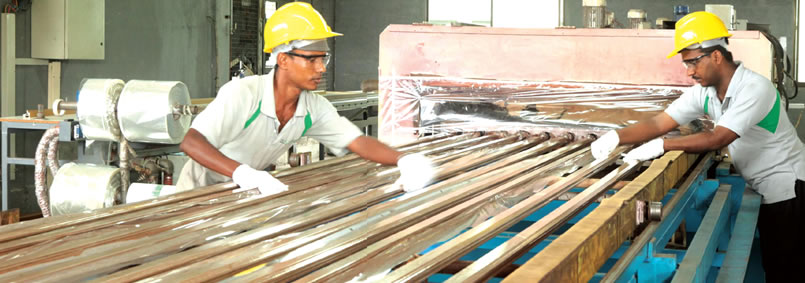
A key milestone
during the year
was the listing
of Alumex on the
Colombo Stock
Exchange through
an initial public
offering, making it
the eleventh listed
company within the
Hayleys Group
Operations
Exploiting its competitive advantage in terms of modern technology, in-house die making capability, higher production capacity and flexibility in manufacturing customised products coupled with a strong financial position, the Alumex Group made considerable progress in manufacturing high quality aluminium extrusions for door and window systems under licence.A key milestone during the year was the listing of Alumex on the Colombo Stock Exchange through an initial public offering, making it the eleventh listed company within the Hayleys Group. The capital generated by the IPO is being invested in a powder coating plant to cater to the increasing demand in the industry for such products.
Key challenges during the year were in maintaining our competitive position in the market and managing the volatility in the liquidity position in the construction industry. In contrast, raw material prices remained stable throughout the year, lending support to stable selling prices in the market.
Strategies in Action
The Alumex distribution system is being upgraded, both through a centralised warehousing system in Makola as well as expanding warehousing facilities in all the provinces. New product developments are progressing with the support of SLINTEC and in-house engineers, while improvements are being planned to upgrade our testing laboratories. The ERP system used within the Alumex Group is also being upgraded with a manufacturing module to enhance the production planning and control function and to improve delivery times to customers.New Alumex concept and design centres will be established shortly to display doors and windows fabricated using Alumex products with recommended accessories all under one roof, allowing customers to get a touch and feel of the final products, obtain shop drawings, BOQs as well as details and recommendations of fabricators.
Plans for venturing into Myanmar and Bangladesh are being considered, while strengthening existing markets in the Maldives and India. Alumex is also targeting the South Asian region with its own proprietary window and door systems.
Outlook
With the ongoing rapid growth shown in the construction industry driven by the housing and tourism sectors, and the limited timber supplies in the local market, the overall outlook for the Alumex Group is positive. Strong growth in local sales, exports to the South Asian region and developing proprietary door and window systems are expected to be the key drivers in the medium term.| Refer for more information about the sector www.alumexgroup.com |
 |
Agriculture
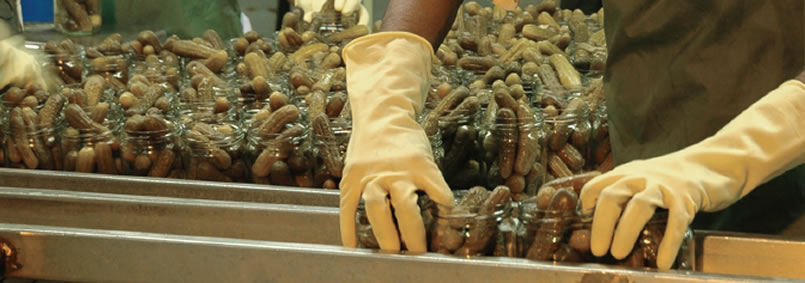
Business growth
through sustainable
value adding
partnerships with our
stakeholders is the
path the sector will
continue to tread
Operations
Hayleys Agriculture maintains a unique product portfolio that offers competitive advantage to channel partners and customers, efficient business processes and agricultural extension capability to provide pre-sale, sale and post-sale services to the agricultural community, and a strong supply chain that facilitates procurement efficiencies and superior margins. Indeed, it is this differentiation that enables us to compete successfully in an ever-demanding local agriculture industry.In a year that saw both drought and extreme rainfall, it was a challenge for the sector to remain on course. Such vagaries of weather impacted on the economic aspects of the agricultural industry, including depletion of cultivation extents, abandoned crops, reduced farmer incomes and inadequate crop management. These led to lower than expected agri input usage. Despite these challenges Hayleys Agriculture remained resilient with its diverse portfolio, notably fertiliser, agri export and animal health businesses doing well.
Likewise, although constrained by adverse weather and inconsistent policies on the use and supply of crop protection inputs, a credible performance was delivered by the crop chemical business, which is testimony for the trust and value placed by the Sri Lankan farmer on the Hayleys Agriculture brand which stands for responsible crop care.
Strategies in Action
Our entry into aquaculture in the previous year to grow seaweed in the Northern waters shows promise for commercial success. Steps are now being taken to commercialise the project with larger extents of cultivation and securing marketing rights.Protected agriculture projects are now under trial as a response to adverse weather conditions. A greenhouse cultivation project with Israeli expertise is in the pipeline and so are many drip irrigation and poly tunnel agricultural projects.
As a value adding and trusted partner to the livestock farmer, a diagnostic and feed analysis laboratory is being setup to assist in disease diagnosis and provide advice on feed ration formulation.
The agricultural food exports division continued to upgrade and expand its production facilities to meet growing demand. It won many accolades during the year for its performance and contribution to Sri Lanka’s agriculture, and for healthy workplace relationships. Going forward, more value added fruit and vegetable products, including coconut-based food and drink products are being developed for our increasing global clientele.
Outlook
Business growth through sustainable value adding partnerships with our stakeholders is the path the sector will continue to tread. Whilst further strengthening our core businesses to increase market share, we plan to make strategic entry into related agribusinesses such as aquaculture, fruit drinks and pest control services. Extension services will be strengthened to support local agriculture. It is paramount to us that we are seen and accepted by all our stakeholders as an ethical and dependable agri inputs and solutions provider. To this end no pains will be spared.The sector is on course for greater results in the coming year based on the superior product portfolio being developed, new businesses and new product introductions, expansion of the distribution network and collaborations with farmer groups, NGOs and Government agencies.
| Refer for more information about the sector www.hayleysagriculture.com |
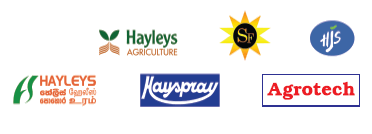 |
Plantations
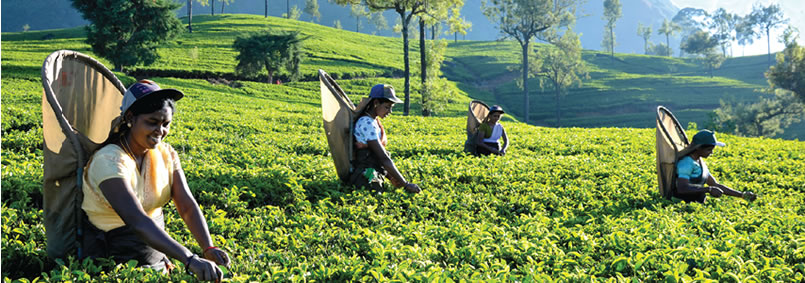
These were
achieved despite
accommodating a
20% wage increase
to plantation workers
and absorbing the
impacts of some of
the most adverse
weather conditions
experienced in over
40 years
Operations
The Plantations sector, led by two regional plantation companies, Kelani Valley Plantations PLC and Talawakelle Tea Estates PLC, together own and manage 44 tea and rubber estates covering a total extent of over 25,000 hectares. The sector includes Mabroc Teas (Pvt) Ltd, a leading exporter of value added teas to over 50 countries. The sector employs over 23,000 people, accounting for 65% of the Hayleys Group’s total workforce.Despite a depressed global rubber market, Kelani Valley Plantations made a significant contribution to profits whilst Talawakelle Tea Estates maintained an excellent performance posting results equivalent to that of their best year. These were achieved despite accommodating a 20% wage increase to plantation workers and absorbing the impacts of some of the most adverse weather conditions experienced in over 40 years. Our plantations continued to employ sustainable practices throughout its agricultural operations and maintained certifications on Rainforest Alliance, UTZ, Global GAP, Ethical Tea Partnership and ISO 22000.
Strategies in Action
We will continue to remain focused on the deployment of resources towards sustainable agricultural practices and productivity initiatives. This will entail investing in infrastructure development, controlling operational costs without sacrificing our commitment to quality, ensuring the well-being of our workers and the communities within which we operate, and maintaining sound environmental practices.Improving land and worker productivity, diversifying our product range and revenue streams, and developing and empowering our human resources are areas that we will continue to work on.
Outlook
On balance, it has been a positive year for the Plantation sector, in the backdrop of sanctions being relaxed and easing of civil unrest in some of our key export markets, tea prices being remunerative into the first quarter and a stable macro outlook for the Sri Lankan economy. We look forward with cautious optimism for a successful year ahead.| Refer for more information about the sector www.kvpl.com www.talawakelleteas.com www.mabrocteas.com |
 |
Transportation & Logistics
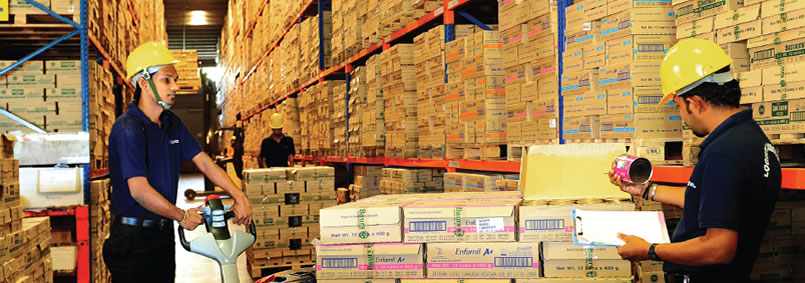
With the Government
initiatives on
establishing
Sri Lanka as a
Logistics Hub,
Hayleys Advantis has
taken the necessary
steps to move
towards free port
operations
Operations
Backed by the strong relationships developed over the years with principals and partners, the Hayleys Transportation & Logistics sector - under the Advantis Group - expanded its service offering during the year. New equipment for heavy cargo projects were added, while technology advancements were made with the implementation of an ERP system to better integrate the sector’s operational systems with a common financial backbone. We also acquired new business accounts under our 3PL Division while securing a new agency representation.Overall performance during the year surpassed expectations although our freight forwarding business faced challenges from fluctuating freight rates and eroding margins.
Strategies in Action
With the Government’s initiatives on establishing Sri Lanka as a Logistics Hub, Hayleys Advantis has taken the necessary steps to move towards free port operations through its newly established subsidiary Hayleys Free Zone Limited. We will work towards better value creation for import and re-export operations, bridging the gap between the manufacturer and the consumer, while overseas we are continuing to exploit our competencies in selected markets.Outlook
With the ongoing infrastructure development projects across the country and the ensuing need for transportation and logistics support, Hayleys Advantis sees a wide range of opportunities for future growth. This is reinforced by the Government’s move towards establishing Sri Lanka as a Logistics Hub, which presents further opportunities for the sector.| Refer for more information about the sector www.hayleysadvantis.com |
 |
Consumer Products

We undertook several
measures to improve
productivity of the
sales force while
also addressing
employee retention
and career growth
Operations
The Consumer Products sector recorded a 20% growth in turnover. However, the PBT was lower than the preceding year due to start-up costs of new operations, higher interest cost during the first half of the year and lower consumer demand in a few key categories.Strategies in Action
The sector continued to focus on driving turnover by developing and acquiring brands in categories with high growth potential, which led to the inclusion of two renowned consumer brands to our portfolio during the year.The Lighting division undertook a promotional campaign, and as a CSR strategy, produced a tri-lingual booklet on saving energy to help consumers reduce their electricity expenses. The Lighting division was restructured to give a better focus on professional lighting solutions. Overall, the sector undertook several measures to improve productivity of the sales force while also addressing employee retention and career growth.
Outlook
We expect business growth arising from a wider product and service offering, higher disposable incomes and improved geographical distribution of income, growth in tourism and stability in exchange and interest rates.| Refer for more information about the sector www.hayleysconsumer.com |
 |
Leisure & Aviation

In our hospitality portfolio, the re-launched Kingsbury turned in a full year’s performance in 2013/14, and set the tone by winning two prestigious accolades
Operations
The year saw the sector - comprising tours, aviation and hotels & resorts - expanding its international outreach, whilst further strengthening its local operations.Our tours/destination management business, driven by Hayleys Travels, focuses on inbound tourism based on a B2B model wherein our principal business partners are foreign tour operators.
In aviation Hayleys presently partners with 110 IATA-accredited passenger General Sales Agents (GSA) countrywide, while our main clientele for cargo GSAs are freight forwarding agents.
In our hospitality portfolio, the re-launched Kingsbury turned in a full year’s performance in 2013/14, and set the tone by winning two prestigious accolades - ‘World Luxury Hotel’ award for the best luxury city hotel in the Indian Ocean, and the ‘Wellness and Spa’ certification as per the stringent European Audit Institute of Wellness Spa quality standards.
Strategies in Action
Hayleys Tours achieved notable milestones such as entry into the Chinese market, the opening of two more overseas representative offices and providing destination related services for cruise lines.Amaya Brand registered a profit before tax of Rs. 417 mn, yet another consistent performance by this segment which includes Amaya Hills, Amaya Lake and the Bungalows of Amaya Hills, as well as the properties under Amaya management such as Langdale and Coral Rock.
Outlook
During FY 2013/14 the passenger GSAs and travel agency business handled passenger numbers in excess of 65,000 whilst on the inbound tourism side there was an approximately 45% increase in the number of guests over the previous year.The aviation business is expected to grow during the next financial year driven by increased sales and marketing activities focused on the corporate client base for passenger sales, coupled with a possible entry into new air cargo markets. We anticipate the profitable progress of destination management operations which has grown at a steady pace since its inception three years ago.
| Refer for more information about the sector www.kingsbury.lk www.amayaresorts.com www.hayleystours.com |
 |
Power & Energy
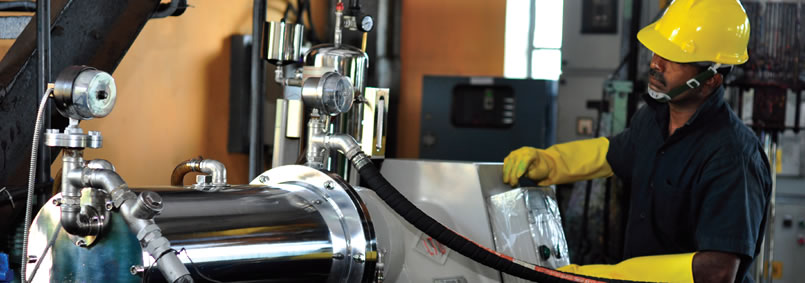
The Nirmalapura
wind farm saw its
first full year of
operations with
power generation
at expected
performance levels
Operations
Several positive strides were made in key business segments. The Nirmalapura wind farm saw its first full year of operations with power generation at expected performance levels. The construction work of the Mawanana 4.5 MW hydro power plant is in progress. In the industrial inputs segment, we ventured into specialised chemicals for the construction industry through a collaboration with a Malaysian principal. Promising initial contacts were made in Pakistan for supplying pigment emulsions for the textile printing industry. The electronics and telecommunication projects business was awarded CCTV contracts of few high-end customers, while we entered fire protection and detection systems in order fill in a gap in the building services engineering sector.The key challenges faced during the year arose from industrial and political issues in Bangladesh that affected our exports, maintaining ex-stock margins in a price competitive market, training and education of end users of high-tech equipment and the mergers and acquisitions of suppliers. Liquidity issues in the local market also affected our working capital.
Strategies in Action
New export markets are being explored to expand the pigment emulsion business and indenting of industrial raw materials. New product development activities are being carried out in collaboration with foreign principals to expand our product offering and to be competitive in the market place. We are earnestly looking for investment opportunities in the renewable energy business and are developing a pipeline of projects.Outlook
Our renewable energy business is expected to perform well with the developments going on to add more capacity to the national grid. New businesses that we embarked on, such as analytical and scientific testing equipment, and building management systems are expected to perform well in coming years with the anticipated economic growth in Sri Lanka. However, challenges are foreseen arising from mergers and demergers of suppliers and principals, as well those arising from suppliers moving towards working direct instead of going through an agent. Further, raw material and energy cost increases would have an impact on product margins.| Refer for more information about the sector www.hayleys.com |
 |
Investments & Services
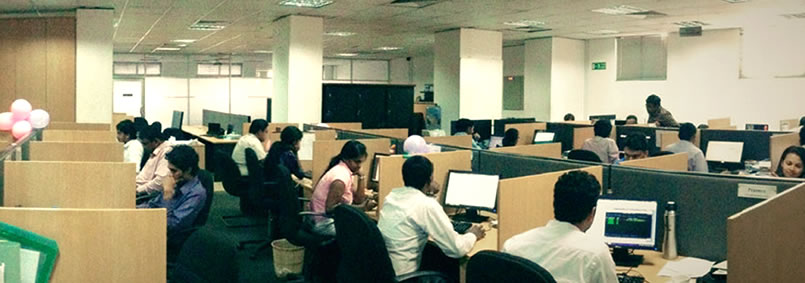
The BPO and SSO
divisions, having
gone through a
transformation
phase, are now
gradually moving
into profitability as a
combined sector
Operations
The Business Process Outsourcing (BPO) and Shared Service Operations (SSO) divisions, having gone through a transformation phase, are now gradually moving into profitability as a combined sector. The Consultancy Services team successfully completed its first assignment of creating a Shared Services Centre Operation for a leading local garment manufacturing group and is well on its way to completing a similar second assignment. There are many other consultancy opportunities that the team is currently evaluating.The BPO division additionally undertook an Information Technology Outsourcing (ITO) software development assignment during the year and will continue to grow this area steadily. The BPO work related to Finance & Accounting (F&A) clients overseas continues to grow, while SSO continues to transition F&A and payroll work of the Hayleys sectors to a common operational centre.
Strategies in Action
The BPO division has identified the Small Medium Enterprise (SME) market in Australia as a growth opportunity on F&A outsourcing work. This division has initiated action to grow its software development capability in both the local and Australian markets during the year. The SSO division is exploring opportunities to offer our payroll capabilities to wider segments in the domestic and overseas markets.Outlook
SSO will continue to provide F&A services to all Hayleys business sectors so that the sectors themselves may continue to focus on their individual core businesses. Looking outwards, we will explore the provision of a range of end-to-end value added services in the areas of F&A, payroll processing, software development and other back office processing assignments in both the domestic and selected overseas markets by leveraging on accounts that we have secured up to now.| Refer for more information about the sector www.hayleys.com |
 |
Employee Capital
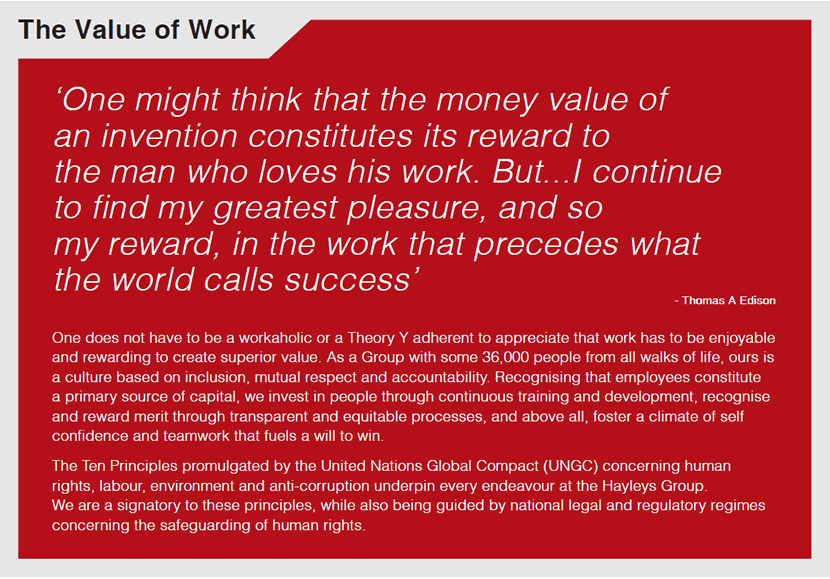
People that Matter
The table below provides an analysis of our staff based
in Sri Lanka
as at 31st March 2014 with outsourced personnel
excluded. The total workforce accounted for 36,224
persons, of whom 40% were females and 7.5% were
of executive and higher grades. The Plantations sector was by far the largest employer, contributing to 65% of
the total workforce, and the only sector where females
outnumbered males.
Outsourced staff comprised those providing security and janitorial services who are employed by respective agencies.
Sri Lanka Workforce
| Sector/Company | Executive & Above | Clerical & Supervisory | Manual Grade | Total | Grand Total | ||||
| Male | Female | Male | Female | Male | Female | Male | Female | ||
| Fibre | 99 | 19 | 78 | 18 | 625 | 458 | 802 | 495 | 1,297 |
| Hand Protection | 169 | 42 | 89 | 21 | 1,112 | 376 | 1,370 | 439 | 1,809 |
| Purification | 202 | 35 | 66 | 24 | 924 | 131 | 1,192 | 190 | 1,382 |
| Textiles | 152 | 36 | 234 | 17 | 809 | 5 | 1,195 | 58 | 1,253 |
| Construction Materials | 58 | 6 | 74 | 9 | 334 | – | 466 | 15 | 481 |
| Agriculture | 183 | 26 | 223 | 31 | 801 | 246 | 1,207 | 303 | 1,510 |
| Plantations | 192 | 29 | 932 | 207 | 9,798 | 12,269 | 10,922 | 12,505 | 23,427 |
| Transportation & Logistics | 594 | 114 | 188 | 14 | 1,729 | 58 | 2,511 | 186 | 2,697 |
| Consumer Products | 87 | 22 | 154 | 31 | – | – | 241 | 53 | 294 |
| Leisure & Aviation | 234 | 84 | 855 | 100 | 292 | 45 | 1,381 | 229 | 1,610 |
| Power & Energy | 103 | 43 | 27 | 4 | 51 | – | 181 | 47 | 228 |
| Investments & Services | 113 | 92 | 26 | 3 | – | 2 | 139 | 97 | 236 |
| Total | 2,186 | 548 | 2,946 | 479 | 16,475 | 13,590 | 21,607 | 14,617 | 36,224 |
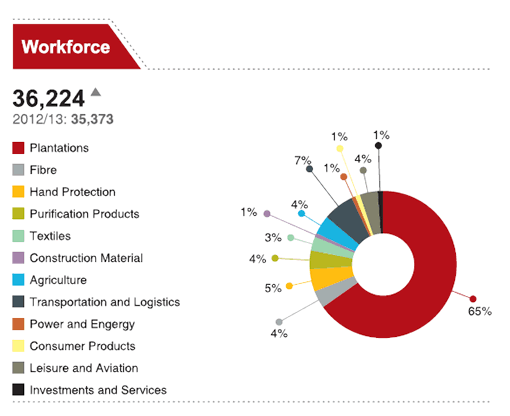
Employee Turnover by Category
| Sector/Company | Executive & Above | Clerical & Supervisory | Manual Grade | Overall |
| Hayleys PLC | 10 | 2 | 0 | 12 |
| Fibre | 23 | 9 | 20 | 52 |
| Hand Protection | 26 | 0 | 0 | 26 |
| Purification | 17 | 5 | 18 | 40 |
| Textiles | 26 | 6 | 16 | 48 |
| Construction Materials | 5 | 7 | 13 | 25 |
| Agriculture | 13 | 21 | 9 | 43 |
| Plantations | 10 | 4 | 6 | 20 |
| Transportation & Logistics | 90 | 13 | 25 | 128 |
| Consumer Products | 10 | 31 | 0 | 41 |
| Leisure & Aviation | 12 | 53 | 15 | 80 |
| Power & Energy | 2 | 0 | 0 | 2 |
| Investments & Services | 33 | 0 | 0 | 33 |
Employee Benefits
Permanent employees enjoy benefits such as health care which includes surgical & hospitalisation and disability insurance coverage, hotel discounts, access to Hayleys Group Recreation Club facilities and activities, annual company trips and company maintained bungalows.Employee benefit plan obligations are detailed on Notes to the Financial Statements 3.4.
Collective Bargaining
Freedom of association is a right enshrined in the Hayleys ethos. The manual and clerical staff of following sectors are covered by collective bargaining agreement.| Manual | Clerical | |
| Plantations | 22,067 | 1,139 |
| Purification | 319 | |
| Hand Protection | 337 | |
| Agriculture | 92 | |
| Fibre | 218 | |
| Total | 23,033 | 1,139 |
Notice on Operational Changes
Hayleys extends due notice to employees regarding impending operational changes. Due to diversity and uniqueness of each sector, lead times may vary in each company. However, the Group strictly maintains employees’ right to receive adequate and timely notice of such changes, although no specific provision has been made in the collective agreements with regard to the minimum notice periods for effecting significant operational changes.Occupational Health and Safety
Health, safety and well-being of our employees are essential for our mutual benefit. Through health and safety committees established in each of our key sectors we aim to reduce work-related illnesses and injuries while improving the overall health of our workforce.Health and Wellness
The Passing the Pillow campaign targeted staff members and their families across the Group in multiple locations to create awareness on HIV/AIDS. The campaign was well received and included lectures, poster competitions, quizzes and mini dramas. Programmes were also conducted on diabetes awareness, health & safety, corporate cyber security and energy management.Workforce Participation in OHS
The extent to which the workforce is represented in formal joint management-worker occupational health and safety (OHS) committees varies depending on the sector and the risk level of the operating environment. For example Purification has two formal committees that address OHS which represent 8% of the total workforce. The figure is 5% for Agriculture, 100% each for Construction Materials and Transportation & Logistics.| Number of injuries | Number of lost days | |||||
| Sector | Male | Female | Total | Male | Female | Total |
| Fibre | 13 | 6 | 19 | 120.5 | 50.0 | 170.5 |
| Purification* | 25 | 2 | 27 | 48.0 | 18.0 | 66.0 |
|
Construction Materials |
18 | – | 18 | 89.0 | – | 89.0 |
|
Transportation & Logistics |
9 | – | 9 | 189.0 | – | 189.0 |
| Plantations | 61 | 52 | 113 | 98.0 | 52.0 | 150.0 |
Training and Development
We believe in continuous learning and development of our employees and provide such opportunities that are aligned with the organisation’s business goals and strategy. The table below indicates the average number of hours of training provided per employee during the year, analysed by gender, employee grade and business sector.Average Training Hours per Employee for FY 2013/14
| Executives & Above | Clerical & Supervisory | Manual | ||||
| Male | Female | Male | Female | Male | Female | |
| Fibre | 103.0 | 6.7 | 7.9 | 6.4 | 4.3 | 4.7 |
| Purification | 20.5 | 16.0 | 3.4 | 5.9 | 12.1 | 11.8 |
| Textiles | 9.6 | 2.8 | 2.3 | 2.4 | 1.6 | 4.9 |
| Construction Materials | 8.5 | 6.0 | 0.5 | 5.3 | 1.3 | – |
| Agriculture | 20.0 | 2.0 | 21.0 | 20.0 | 34.0 | 35.0 |
| Plantations | 9.0 | 12.9 | 5.7 | 4.3 | 3.1 | 2.4 |
| Transportation & Logistics | 14.0 | 13.3 | – | – | – | – |
| Consumer Products | 11.8 | 21.2 | 8.3 | 9.0 | – | – |
| Leisure & Aviation | 11.0 | 5.3 | – | – | – | – |
| Power & Energy | 111.4 | 75.2 | – | – | 40.4 | 38.3 |
| Overall | 318.8 | 161.4 | 49.1 | 53.3 | 96.8 | 97.1 |
Human Rights
Investment Agreements that Include Human Rights AspectsWe believe in the dignity of every human being and respect individual rights as set forth in the UN Global Compact (UNGC) concerning human rights, labour, the environment and anti-corruption principles. The Group is signatory to these principles. All companies within the Group are guided by the principles of the UNGC and Sri Lanka’s legal and regulatory regimes concerning safeguarding of human rights.
Abolition of Child Labour
Our basic principle is that individuals younger than 18 years of age may not work for any of our sectors or suppliers. In the Plantations Sector in particular, a Human Resource Management Policy has been formulated and communicated to all employees to prevent child labour. There is also strict adherence to the Collective Agreement signed with the worker trade unions and close monitoring and supervision of operations by management in this sector.
Social and Environmental Capital
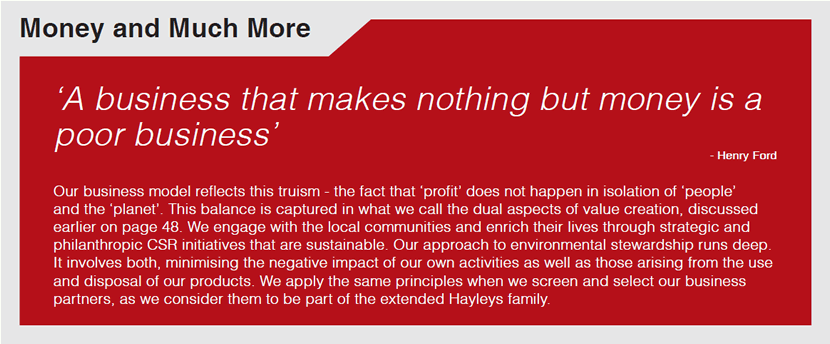
Supporting Local Communities
The enterprise of Hayleys has touched the lives of
many, both directly and indirectly. We support local
entrepreneurs and buy local as far as possible. Many of
our sectors are directly involved in strategic CSR projects
with local communities that are mutually beneficial. Firstlight ™ is a local sourcing initiative developed by our Hand Protection sector, led by DPL. Coupled with market sustainability and CSR, it is aligned to empower smallholder rubber farmers to achieve their full potential. DPL engages with all components of the value chain, from suppliers to buyers and end customers, thereby encouraging the move towards ethically sourced and manufactured products.
Supporting the development of the plantation community is an important management strategy of our plantation companies. The multi-dimensional initiative branded as ‘A Home for Every Plantation Worker’ that was launched in 2006 is an ongoing project that has won recognition as a benchmark practice by the Global Compact Sri Lanka Network.
In agriculture, Hayleys pioneered the outgrower and subcontractor model in Sri Lanka over three decades ago. This is a backward integration strategy that enhances supplier relations while providing an assured income stream to rural farmers. We support such arrangements with a range of services that include impact assessments, studies on farmer profitability and productivity, and training programmes. Our outgrower network presently exceeds 4,200 suppliers, with over a third engaged in growing gherkins for the export market.
Supply Chain
Our supply chain consists of a vast network of suppliers and distributors with varying level of sophistication. Our effective management of them has been part of the Groups’ success. Our manufacturing operations continue to engage its with suppliers through personal interaction and community activities. The Firstlight programme of DPL is one such initiative. The sustainable development of its suppliers has allowed DPL to ensure suppliers’ commitment to provide uninterrupted supply for its manufacturing operations.Projects throughout the Groups’ manufacturing operations create a close link with its suppliers to minimise supply interruptions whilst maintaining a flexibility to adapt to the changing environment.
Integrity and Business Ethics
Our long-standing commitment to doing business with integrity and transparency, a key element in our corporate values, also means avoiding corruption in any form. We conduct periodic anti-bribery audits of all our business operations to detect potential misconduct and monitor compliance with anti-corruption laws and relevant policies.The Group’s Legal services has not been informed of or has pursued any action where any fines were imposed on the Hayleys Group in relation to non-compliance with laws and regulations relating to corruption and related matters during the year.
Commitments to External Initiatives
Hayleys is a signatory to the UN Global Compact and a steering committee member of the Lanka Business Coalition on HIV/AIDS to name a few of our local and international initiatives.Members of senior management of the Group hold membership in key professional, business and governance bodies and participate in their activities and projects. We regard such time and effort spent is important as such bodies are in a strong position to present alternative views, address industry issues and in general play an important role in the development of the economy, environment and community at large.
A complete listing of accreditations and certifications received or renewed during the year as well as memberships are given in Annexes.
Materials Usage
We are committed to responsible product stewardship and practice the 3R concept - reduce, reuse, recycle. We strive to improve the life cycle of the products we make - from the raw materials and services we procure for operations, through distribution, end use and management of product disposal. We use recycled material as much as possible in our operations but not at the expense of quality.Energy Efficiency Improvements
Many ongoing initiatives are in place across our sectors to manage the effective and efficient use of energy. Some of the key activities undertaken during the year are summarised below:- Energy audit was conducted in June 2013 for the Hayleys head office premises 25, Foster Lane and 400, Deans Road.
- All air conditioners were regulated to maintain a temperature of 23C.
- Hayleys Group commemorated Earth Hour on 28th March, 2014 signifying its commitment to the conservation of energy and the environment.
- A Group wide email campaign was carried out by the Corporate Sustainability Team to communicate the importance of saving energy.
- Hayleys Agriculture carried out a project to recycle packaging material to avoid soil contamination and reduce solid waste at the Haychem Factory in Kottawa.
- Hayleys Agriculture HJS factory in Biyagama is producing bio-gas using waste and using this energy for canteen and laboratory activities.
- The above HJS factory in Biyagama changed all light bulbs to CFL bulbs and solar PV panels were installed to power electrical boilers.
Water Consumption and Discharge
Safe, clean, accessible water is essential to the well-being and economic prosperity of the communities we serve, and also to the ecosystems upon which we all rely. It is also vital for our business operations. Therefore, we are intensely engaged in water stewardship. Likewise, business units ensure that water discharge meet all applicable regulatory requirements.Our Carbon Footprint
We are reporting our Greenhouse Gas (GHG) emissions voluntarily for the third consecutive year, analysed by business sector and scope. Like before, it is based on the WBCSD/WRI Greenhouse Gas Protocol Corporate Standard and the most recent versions of applicable appendices and calculation tools. Financial control is the basis for consolidating GHG emissions, and the boundary is the Sri Lanka operations of the Group.We continue to refine our measurement processes and extent of coverage, and are including GHG emissions from the Textiles sector and fugitive emissions from refrigeration and air conditioning equipment for the first time. These make our reporting complete across sectors as well as under Scopes 1 and 2, while reporting under the optional Scope 3 remains selective based on data availability and materiality.
As before, we are reporting emissions at Group level (but analysed by sectors), and not from an individual company perspective. This makes a difference in the assignment of Scopes for purchased electricity, although the consolidated total is unaffected.
Carbon Footprint by Sector and Scope, tonnes CO2 equivalent
| Scope 1 | Scope 2 | Scope 3 | Total by sector | Share by sector, % | Emissions intensity* tCO2e/ Rs. mn | ||||
| Sector | Stationary combustion | Mobile combustion | Fugitive emissions | Purchased electricity | Air travel | Other | |||
| Manufacturing | |||||||||
| Fibre | 458 | 279 | 3 | 944 | 1 | – | 1,684 | 2.1 | 0.45 |
| Hand Protection | 6,974 | – | 2 | 4,672 | 68 | – | 11,716 | 14.5 | 0.87 |
| Purification | 15,774 | 1,056 | 42 | 1,747 | 88 | – | 18,705 | 23.2 | 1.80 |
| Textiles | 9,773 | 143 | 3 | 8,139 | 30 | – | 18,088 | 22.5 | 2.26 |
| Construction Materials | 2,384 | 20 | 19 | 2,338 | 15 | – | 4,776 | 5.9 | 1.70 |
| Agriculture & Plantations | |||||||||
| Agriculture | 780 | 1,005 | 12 | 662 | 37 | – | 2,495 | 3.1 | 0.33 |
| Plantations | 231 | 1,755 | 5 | 6,858 | 29 | – | 8,879 | 11.0 | 0.92 |
| Services | |||||||||
| Transportation & Logistics | 9 | 7,101 | 21 | 964 | 72 | 166 | 8,332 | 10.3 | 0.68 |
| Consumer Products | – | 300 | 2 | 26 | 9 | – | 336 | 0.4 | 0.06 |
| Leisure & Aviation | 909 | – | 90 | 2,762 | 48 | – | 3,809 | 4.7 | 0.87 |
| Power & Energy | – | 14 | 3 | 74 | 15 | 113 | 220 | 0.3 | 0.03 |
| Investments & Services | – | 32 | 3 | 56 | 15 | – | 106 | 0.1 | 0.12 |
| Holding Company | 11 | – | 11 | 1,379 | – | – | 1,401 | 1.7 | N/A |
| Total GHG emissions by source | 37,303 | 11,705 | 216 | 30,621 | 427 | 279 | 80,547 | 100 | 0.99 |
|
Share of GHG emissions by source, % |
46.3 | 14.5 | 0.3 | 38.0 | 0.5 | 0.3 | 100 | ||
The total GHG emissions of the Hayleys Group during FY 2013/14 amounted to 80,547 tonnes carbon dioxide equivalent (tCO2e), which is significantly higher than the 54,014 tCO2e reported for the previous year, largely due to the inclusion of the Textiles sector. On the other hand Scope 1 fugitive emissions, also included for the first time, are seen to be insignificant.
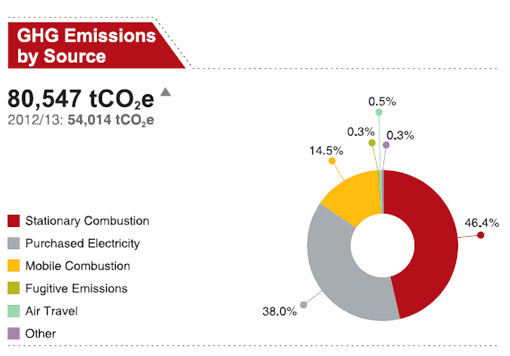
Analysed by Scope, direct GHG emissions under Scope 1 accounted for the largest share at 61% of the total, followed by indirect GHG emissions from purchased electricity with a 38% share under Scope 2.
Analysed by sector, manufacturing, which contributed 48% to Group revenue, accounted for 68% of total GHG emissions under Scopes 1 and 2 with Purification, Textiles and Hand Protection leading the way. They are large manufacturing sectors serving the direct and indirect export markets.
Emissions intensity, measured as the total of Scopes 1 and 2 GHG emissions per Rs. million of revenue, was highest in the Textiles sector at 2.26 tCO2e/ Rs.mn, followed by Purification (1.80 tCO2e/Rs.mn) and Construction Materials (1.70 tCO2e/Rs.mn), while the Group average amounted to 0.99 tCO2e/Rs.mn.
Going forward, we will further refine measurement processes and also include any unaccounted entities coming within the defined boundary. This will pave the way for benchmarking our environmental performance more consistently and accurately over time, as well as against peers. Internal target setting too would commence, with positive spin-offs in terms of energy efficiency, fuel switching and cost savings.
Waste Disposal
Waste is segregated and disposed of in compliance with applicable regulations. Details of disposal of hazardous and non-hazardous waste generated during the year are given below in respect of the Purification, Textiles, Construction Materials, Agriculture, Plantations, Transportation & Logistics and Leisure & Aviation sectors.Waste by Type and Disposal Method
| Method of disposal | Hazardous | Non-hazardous | ||
| Tonnes | % | Tonnes | % | |
| Reuse | 72.0 | 3.6 | 1,810.2 | 50.6 |
| Recycle | 91.9 | 4.6 | 1,014.4 | 28.4 |
| Incineration (mass burn) |
1,025.6 | 50.9 | 117.7 | 3.3 |
| Landfill | – | 0.0 | 77.3 | 2.2 |
| Deep well injection | – | 0.0 | 1.5 | 0.0 |
| Composting | – | 0.0 | 3.7 | 0.1 |
| On-site storage | 3.2 | 0.2 | 100.0 | 2.8 |
| Other/third party | 821.8 | 40.8 | 450.1 | 12.6 |
| Total | 2,014.6 | 100.1 | 3,574.9 | 100.0 |